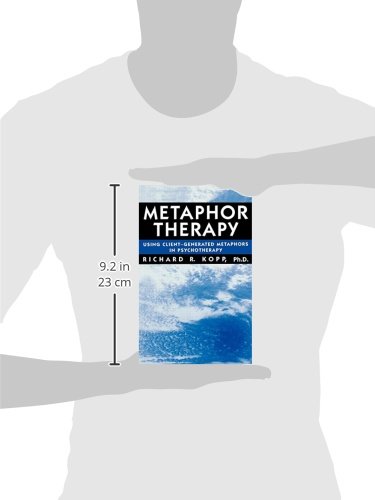All Categories






Metaphor Therapy: Using Client Generated Metaphors In Psychotherapy
Share Tweet








Metaphor Therapy: Using Client Generated Metaphors Features
-
Metaphor
About Metaphor Therapy: Using Client Generated Metaphors
Product Description From the front flap of this 188 page book: "For many years therapist-generated metaphoric interventions have been used to enhance psychodynamic, Ericksonian, and family systems approaches to therapy. However, it now is becoming evident that the use of metaphor in therapy does not have to be restricted to any single approach or method. [This book] introduces two important new methods for using metaphor as an intervention technique in psychotherapy - both involving client-generated metaphors, rather than the traditional metaphoric intervention suggested by the therapist. By helping a client identify and explore his or her own metaphors, the therapist will be better able to understand the belief system that is reflected in the client's metaphoric speech and early memory metaphors. It will also enable the therapist to access and employ the client's own insight to stimulate positive growth and change. This book provides a step-by-step process for learning two specific approaches to client-generated metaphoric intervention. The firs involves exploring and transforming the client's metaphoric language. The second focuses on exploring and transforming the client's early memory metaphors. Numerous case studies help illustrate these methods. In addition to outlining how a client-generated intervention is accomplished, the book examines specific skills that will help the therapist become more successful in these interventions. Practitioners will also find that the client-generated metaphor therapy described in the book is sensitive to culture, ethnicity, gender, sexual orientation, making it ideally suited for working with diverse populations. In addition, both methods are compatible with a wide range of therapeutic modalities and orientations. Finally, the book explores the role of the linguistic, cognitive, sensory-effective, and neuropsychological processes that contribute to the therapeutic changes resulting from a client-generated metaphor." From the Back Cover Metaphor Therapy introduces two important new methods for using metaphor as an intervention technique in psychotherapy - both involving client-generated metaphors, rather than the traditional metaphoric intervention suggested by the therapist. It will also enable the therapist to access and employ the client's own insight to stimulate positive growth and change. Written as a training manual for professionals, this book provides a step-by-step process for learning two specific approaches to client-generated metaphoric intervention. The first involves exploring and transforming the client's metaphoric language. The second focuses on exploring and transforming the client's early memory metaphors. In addition to outlining how a client-generated intervention is accomplished, the book examines specific skills that will help the therapist become more successful in these interventions. Practitioners will also find that the client-generated metaphor therapy described in the book is sensitive to culture, ethnicity, gender, and sexual orientation, making it ideally suited for working with diverse populations. In addition, both methods are compatible with a wide range of therapeutic modalities and orientations, including individual, couples, and family therapy; psychodynamic therapy; cognitive-behavioral therapy; humanist-existential therapy; and family systems therapy, in either brief or long-term approaches. Finally, the book explores the role of the linguistic, cognitive, sensory-affective, and neuropsychological processes that contribute to the therapeutic changes resulting from a client-generated metaphor. About the Author Richard R. Kopp, Ph.D., is a professor at the California School of Professional Psychology, Los Angeles, and a member of the faculty of ICASSI, (The International Committee for Adlerian Summer Schools and Institutes). He also maintains a private practice as a clinical psychologist in Sherman Oaks, California. Dr. Kopp is a consulting edito
























